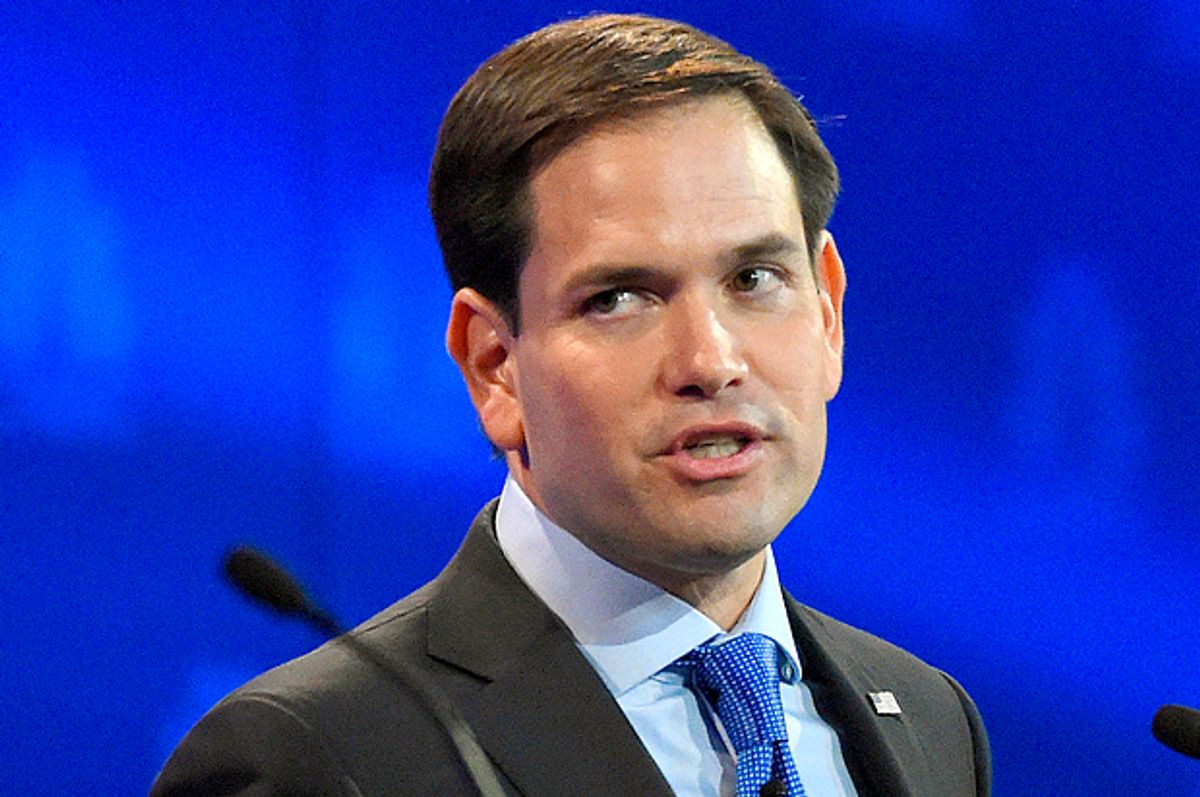Marco Rubio spoke with CBS News’ John Dickerson this weekend and was asked about his tax plan, which cuts rates on income, eliminates taxes on investments and estates, cuts the corporate tax rate, and introduces new tax credits. Cutting all those taxes while doling out new tax credits is an expensive proposition – the conservative Tax Foundation estimates that Rubio’s plan would cost the government $6 trillion in revenues over the next decade. (Citizens for Tax Justice, a left-leaning group, puts the number at nearly double that.) Given that even conservative pundits criticize Rubio for the price tag attached to his plan, Dickerson’s question to the 2016 Republican candidate was simple: “How are you going to pay for this?”
It’s a good question, given how much alarm Rubio has raised about the dangers of growing the national debt. For years he’s been arguing that our debt is harming the economy, and back in July he warned of a looming debt crisis that “would be catastrophic for the most important economy in the world.” So how does Rubio square those concerns with his proposed tax scheme that threatens to add many more trillions of dollars to the existing debt?
The answer is that Rubio doesn’t give a damn about the math. But he has to make it look like he’s concerned about the debt while he redirects government revenues to the pockets of the wealthy, so he says everything will work out thanks to “dynamic scoring” and massive spending cuts:
"The argument about the debt, which is the question that he's raising, you cannot simply solve that through a tax plan alone," the senator explained. "It has to be a combination of things. You have to have the spending discipline on the mandatory spending programs and you need to sustain significant economic growth."
"The tax plan is part of the economic growth part of that equation...in conjunction with that, we must deal with the mandatory spending programs. Medicare and Social Security must be reformed for future beneficiaries, people like me, who are 25 years away from retirement," Rubio added.
The “economic growth part of that equation” is the assumption – popular among supply-side economists despite a lack of compelling evidence – that huge tax cuts for rich people will unleash impossibly large amounts of economic growth. The Tax Foundation already ran the numbers to take this “dynamic effect” into account, and even under this optimistic scenario, Rubio’s plan will still cost $2.4 trillion over 10 years. But Rubio is absolutely correct that one can’t just look at the tax side – you have to look at spending as well. Rubio says he’s going to make unspecified cuts to entitlement spending (a famously easy and politically popular endeavor) to cover up the shortfalls imposed by his tax cuts. But we’re talking about an unprecedentedly large package of tax cuts, and as Ezra Klein notes, “paying for them would require spending cuts or tax changes that dwarf anything we've seen in recent American history.” Paying for these cuts, writes Bob McIntyre at Citizens for Tax Justice, “will require draconian cuts to essential public services and likely wreck our economy.”
But it gets even trickier! While Rubio’s cutting spending on programs that aid the poor, he’s also going to massively increase the defense budget. The military spending plan Rubio laid out yesterday calls for vast expansions of pretty much every branch of the armed forces. If you’re cutting spending on social programs to pay for huge tax cuts, but also increasing spending on bombs and new warplanes, then you’re working at cross purposes. But, as Rubio’s campaign is fond of saying, “nothing matters if we aren’t safe,” which also explains why Rubio pushed huge, unpaid-for increases to defense spending earlier this year. “Justifying the lack of offsetting cuts in his proposed amendment,” the Los Angeles Times reported at the time, “Rubio insisted that every other concern pales in comparison with the need for a strong defense.”
Looking at all this, you have to conclude that Rubio – all his dire warnings notwithstanding – doesn’t really care too much about debt. He has very specific ideas about which taxes he’d like to cut (the ones that primarily affect the wealthy), and very specific ideas about which areas of federal spending he’d like to increase (everything related to defense). But when it comes to offsetting these costs, he’s impossibly vague, promising that everything will be covered by “sustain[ed] significant economic growth” (which he can’t guarantee) and ruinous cuts to spending (which he won’t detail). The math just doesn’t work, and it renders Rubio’s debt alarmism completely hollow.

Shares